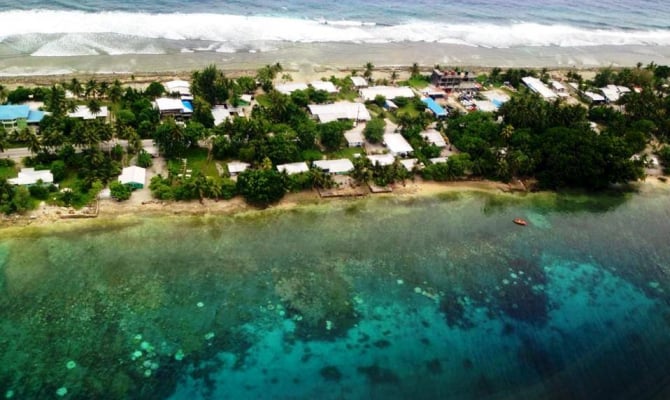In amongst combatting sea level rise, threat to water and food security, and extreme weather events – our Pacific Island region will also need to contend with the loss of Pacific tuna stocks also under threat from climate change.
The abundance and distribution of the four economically important tuna in the western and central Pacific – subtropical albacore tuna, and tropical bigeye, skipjack and yellowfin – is predicted to change as oceans become warmer with climate change.
If ocean warming continues at the current rates, the tuna catches in the combined waters of 10 Pacific islands is expected to decline by an average of 20% by 2050. This will have a huge impact on the “tuna-dependent” islands of the Federated States of Micronesia, Cook Islands, Kiribati, Nauru, Palau, Papua New Guinea, Republic of the Marshall Islands, Solomon Islands, Tokelau and Tuvalu.
“I cannot imagine trying to displace the tuna from the people of the Marshall Islands – our livelihoods and out culture, it is difficult to comprehend,” said Bruce Billimon, Minister of Health and Human Services of the Republic of the Marshall Islands.
Minister Billimon presented alongside H.E Kay Harrison, Ambassador of Climate Change for New Zealand at a special event – “Warming Ocean threatens tuna dependent Pacific countries and territories” in the Moana Blue Pacific space at COP26 in Glasgow.
“Tuna moving away from us affects the security of my country. It will affect our livelihoods, our education, our environment – it’s a key source of revenue that sustains and contributes to the development and progress of my society and country.”
Estimates suggest annual losses of an average of USD 90 million in fishing fees and reductions in government revenue, in all of the ten Pacific islands by up to 13% per year by 2050.
These tuna losses will have serious consequences for governments and Pacific people, who depend on tuna revenue to support livelihoods and vital programs in key sectors such as education and health. The losses are also expected to reduce the financial flexibility needed to assist communities to adapt to climate change.
Stronger climate ambitions are needed to help address the serious consequences that tuna losses due to climate change will have for governments and Pacific people.
“This is about working together, it’s not about this is my patch and that is your patch, and the brilliant thing about the Pacific is it is an example to others – the way the region is working together in fisheries. The Pacific Nauru Agreement has shown the power of Pacific leadership in developing economic benefits of fisheries,” said H.E Kay Harrison, Climate Change Ambassador for New Zealand.
“Tuna fisheries makes up 84% of the government revenue in Tokelau, this climate change impact will be devastating for Tokelau. It’s the mitigation of climate change that we need to be stressing to everyone that is here in Glasgow- 1.5. We need 1.5.”
The Pacific is the only oceanic fishery with stocks at sustainable levels, a resource that is successfully managed. At COP26 in Glasgow, the Pacific is calling upon the world to Flex for 1pt5 – to help save the island region.
“The Pacific means peaceful, calm, and ironically the Pacific is one of the regions first impacted by sea level rise, and if there is no peace then you can imagine what will be,” said Hon. Bruce Billimon, Minister of Health and Human Services of the Republic of the Marshall Islands.
“As a global community we see everyone as one. We have to fight the challenge of climate change as one. Working together as one we can overcome this challenge. This is what we have.”
Bruce Billimon is a Pacific Climate Champion at COP26 for climate ambition.
This story was produced by Leanne, published at SPREP on 04 November 2021, reposted via PACNEWS.




